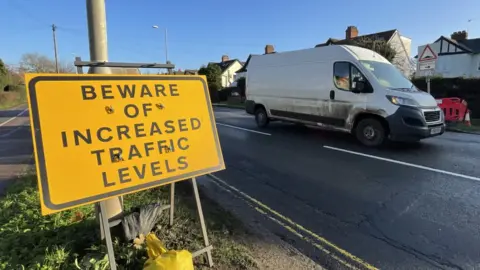More than half reject Cambridge congestion charge plans
 BBC
BBCMore than half of respondents to a consultation about public transport in Cambridgeshire rejected proposals that include charging motorists.
The consultation asked for views about a huge expansion of public transport paid for by a £5 minimum daily charge for driving into or within Cambridge.
More than seven out of 10 respondents supported plans to improve the bus network.
The proposals will be discussed next month - and could now be changed.

The Greater Cambridge Partnership (GCP) - a body that includes three councils, academia and businesses - put forward the idea.
It would see an expansion of buses worth around £50m a year paid for by a charge on driving in Cambridge between 07:00 and 19:00 on weekdays.
Car drivers would pay £5, van drivers £10 and lorries £50 to enter or drive inside a Sustainable Travel Zone (STZ) covering the city.
The GCP has promised a "London-style" bus network in return, as well as improvements to the cycling and walking infrastructure.
Lynne Miles, director of the City Access Programme at the GCP, said: "We've learned that people really want to see that bus future vision delivered - we've learned they really want an alternative situation to what we've got today.
"We know that they have concerns about the way in which we propose that's delivered."

The GCP received more than 24,000 responses to the consultation, a record for the organisation.
One question in the survey asked if people "support or oppose" creating a charging zone for motorists in Cambridge to pay for public transport improvements.
More than half - 58% - said they opposed or strongly opposed that part of the plans. Those aged 55 to 64 were most likely to oppose them, but a majority of under-25s were supportive.
Those who live outside Cambridge were more likely to be against the proposals.

Mrs Miles added: "We definitely need to listen to the fact that 58% of them are not that happy with the STZ charges as we've set out.
"We also need to listen to the 70% of people who do want the thing we delivered."
Elisa Meschini, a Labour county councillor and chair of the GCP, said that consultations "are not referendums" or "decision-making tools" but are "information gathering tools".
She added: "There's a lot of drilling down to be done because about half of the people who said 'I don't like this' have also said to us 'there are things that you could change that would make me like it more'.
"That's exactly the kind of thing we were after. That's exactly the kind of thing we want to look at.
"Are these things that people are telling us they want us to do, possible? Are they going to deliver what the scheme objectives are supposed to be and if they do, can we do them and can we find agreement?"

Those compromises could include changing the charging rates, the hours of operation, the zone boundary and who qualifies for exemptions.
Ms Meschini said that while "those parameters can be changed… they have an impact on the viability of the scheme".
"There is only so small that you can make the zone and only so low you can make the charge," she said.
Brian Milnes, a Liberal Democrat councillor in South Cambridgeshire who sits on the GCP Executive Board, said including Addenbrooke's Hospital in the charging zone had been raised during the consultation.
 Jenny Kirk/BBC
Jenny Kirk/BBCHe added: "There was a lot of comment about Addenbrooke's and we think we've come up with a way that we could stop charging people - either visitors or patients at Addenbrooke's - from being charged.
"That's still got to go through a process of evaluation. Can we make it work? What does it do to the benefits?"
The GCP's Joint Assembly will meet to discuss the proposals and consultation results on 8 June and the organisation's board will discuss them at a meeting in July.

Find BBC News: East of England on Facebook, Instagram and Twitter. If you have a story suggestion email eastofenglandnews@bbc.co.uk